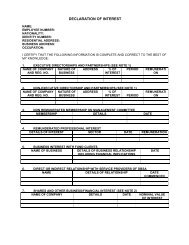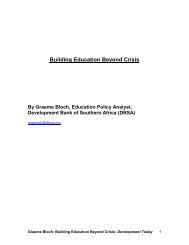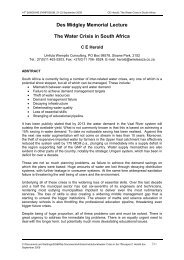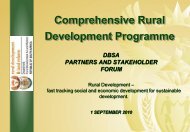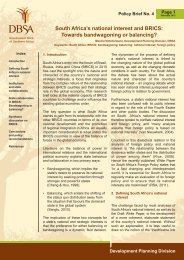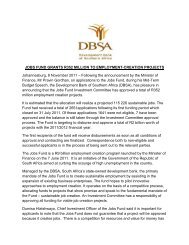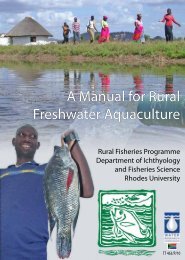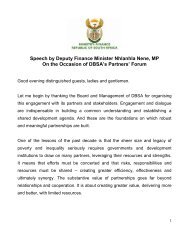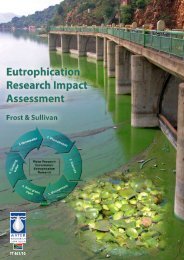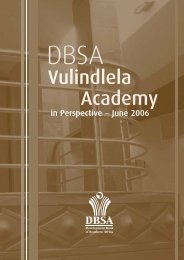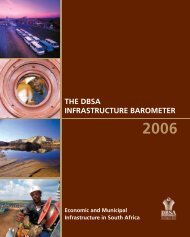A Knowledge Strategy
A Knowledge Strategy
A Knowledge Strategy
Create successful ePaper yourself
Turn your PDF publications into a flip-book with our unique Google optimized e-Paper software.
This will only happen if:<br />
• individuals are motivated to contribute to organisational knowledge creation<br />
and sharing through a rewards system;<br />
• support and learning are provided by senior management;<br />
• the individual and organisation recognises the benefits.<br />
<strong>Knowledge</strong> has not merely assumed greater influence. It plays a central role in the<br />
future success of the DBSA. The incremental and pragmatic approach that has<br />
been formulated will ensure that knowledge management contributes to achieving<br />
the goals set by the Bank.<br />
1.2 <strong>Knowledge</strong> and the Bank<br />
A strong linkage exists between knowledge management and business<br />
performance. The DBSA has always recognised that socio-economic development<br />
is as much about imparting knowledge as it is about the application of resources<br />
committed to ensuring sustainable development outcomes. In the recent past,<br />
however, the Bank’s operating environment has become significantly more<br />
competitive and challenging, and the role of knowledge increasingly critical to its<br />
effectiveness, if not its continued survival. In theory, critical organisational success<br />
has depended on the focused application of knowledge to two areas: innovation of<br />
customer-orientated processes, products and services; and, the promotion of<br />
organisational efficiency and effectiveness.<br />
To achieve innovation the Bank must be a learning organisation, accumulating<br />
knowledge and deploying it into products, services and processes. The Bank also<br />
has to be a knowledge-sharing organisation, which will enable it to increase internal<br />
synergy and enhance partnerships with its clients, stakeholders and other external<br />
role-players. Increasing success at pursuing these goals in future will be a key<br />
determinant of the DBSA’s impact as development financier, facilitator and catalyst.<br />
1.3 <strong>Knowledge</strong> in practice<br />
<strong>Knowledge</strong> is an acquired human or institutional capacity derived from<br />
experience and learning. It is formed and shared by individuals or by groups<br />
assembled in formal or informal structures having a shared purpose such as<br />
clusters, units, teams or discussion groups. <strong>Knowledge</strong> is internalised learning,<br />
whether it is internalised in individuals or institutionalised in organisations. It is<br />
deployed in various forms, such as in decision-making processes, in operating<br />
processes that facilitate organisational goals, or in products that meet client needs.<br />
<strong>Knowledge</strong> in itself is worthless. It requires a willingness and capacity to put<br />
it to effective use. An organisational culture must emerge that provides incentives<br />
for generating and using knowledge and must be combined with appropriate<br />
institutional architecture and processes.<br />
<strong>Knowledge</strong> management consists of three component processes:<br />
• the creation of knowledge – the assembly, analysis and synthesis of all types of<br />
information and data, and the development of new insights that can<br />
strengthen the organisation’s activities, processes or outputs;<br />
2 Development Bank of Southern Africa



